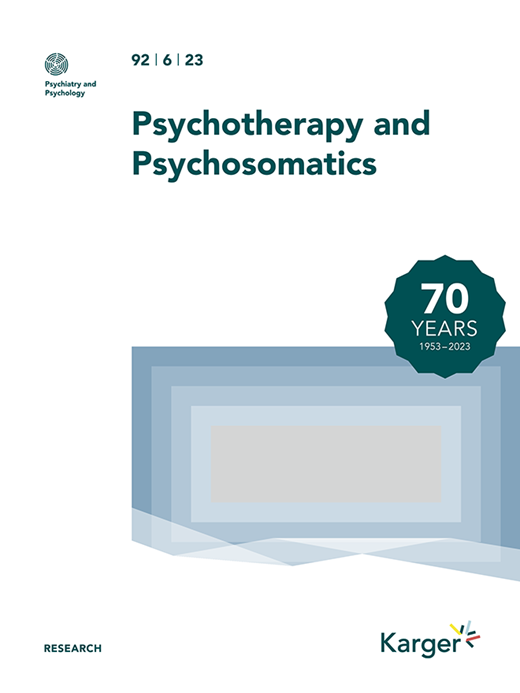Dialectical Behaviour Therapy to Treat Emotion Dysregulation in Autistic adults without Intellectual Disability: A Randomised Controlled Trial.
IF 17.4
1区 医学
Q1 PSYCHIATRY
引用次数: 0
Abstract
INTRODUCTION Emotion dysregulation is prevalent in autistic adults without intellectual disability whereby it has been associated with heightened non-suicidal self-injury and suicidal behaviours. Dialectical behaviour therapy (DBT) has shown to be feasible and preliminary findings suggest that it might reduce emotion dysregulation in this population. Yet studies evaluating the efficacy of DBT in this context are lacking. METHODS Sixty-three autistic adults presenting with emotion dysregulation as well as self-harm and/or suicidal behaviours were randomised either to the DBT condition (18-week treatment) or to the waiting list condition. Participants completed self-report scales, including emotion dysregulation, alexithymia, depression and quality of life, at 4 time points (pre-, mid-, post-therapy, six-month follow-up). RESULTS Emotion dysregulation improved in the DBT condition relative to the waiting list condition mid-therapy (β01 = -18.59 [-27.67 to -9.44], Pr (β01 < 0) = 1.000), post- therapy (β02 = -31.91 [-41.67 to -22.30], Pr (β02 < 0) = 1.000), with lasting improvements at follow-up. Alexithymia improvement mediated the therapy effects on emotion dysregulation. Moreover, depressive symptoms and quality of life improved in the DBT condition relative to the waiting list condition post-therapy, with improvements lasting at follow-up. CONCLUSION DBT was found to be effective to reduce emotion dysregulation in autistic adults presenting with self-harm and/or suicidal behaviour. Additionally, improvements on depression and quality-of-life were observed post-therapy. Interestingly, the improvements on emotion dysregulation were mediated by a decrease in alexithymia, consistent with research showing that alexithymia is a central mechanism of emotion dysregulation in autistic adults.辩证行为疗法治疗无智力障碍的成年自闭症患者情绪失调:一项随机对照试验。
简介:情绪失调在无智力障碍的自闭症成年人中很普遍,它与非自杀性自伤和自杀行为的增加有关。辩证行为疗法(DBT)已被证明是可行的,初步研究结果表明,它可能会减少这类人群的情绪失调。方法将 63 名出现情绪失调、自伤和/或自杀行为的成年自闭症患者随机分配到 DBT 条件下(18 周治疗)或等待名单条件下。参与者在4个时间点(治疗前、治疗中、治疗后、6个月随访)完成自我报告量表,包括情绪失调、情感障碍、抑郁和生活质量。结果相对于等待名单条件,DBT 条件在治疗中期(β01 = -18.59 [-27.67 to -9.44],Pr (β01 < 0) = 1.000)和治疗后(β02 = -31.91 [-41.67 to -22.30],Pr (β02 < 0) = 1.000)改善了情绪失调,并在随访中持续改善。亚历山大症的改善介导了情绪失调的治疗效果。此外,DBT治疗后,抑郁症状和生活质量相对于等待治疗者有所改善,且改善效果在随访中持续存在。此外,治疗后抑郁和生活质量也有所改善。有趣的是,自闭症患者情绪失调的改善是由自闭症的减少促成的,这与研究表明自闭症是自闭症成人情绪失调的核心机制是一致的。
本文章由计算机程序翻译,如有差异,请以英文原文为准。
求助全文
约1分钟内获得全文
求助全文
来源期刊

Psychotherapy and Psychosomatics
医学-精神病学
CiteScore
29.40
自引率
6.10%
发文量
46
期刊介绍:
Psychotherapy and Psychosomatics is a reputable journal that has been published since 1953. Over the years, it has gained recognition for its independence, originality, and methodological rigor. The journal has been at the forefront of research in psychosomatic medicine, psychotherapy research, and psychopharmacology, and has contributed to the development of new lines of research in these areas. It is now ranked among the world's most cited journals in the field.
As the official journal of the International College of Psychosomatic Medicine and the World Federation for Psychotherapy, Psychotherapy and Psychosomatics serves as a platform for discussing current and controversial issues and showcasing innovations in assessment and treatment. It offers a unique forum for cutting-edge thinking at the intersection of medical and behavioral sciences, catering to both practicing clinicians and researchers.
The journal is indexed in various databases and platforms such as PubMed, MEDLINE, Web of Science, Science Citation Index, Social Sciences Citation Index, Science Citation Index Expanded, BIOSIS Previews, Google Scholar, Academic Search, and Health Research Premium Collection, among others.
 求助内容:
求助内容: 应助结果提醒方式:
应助结果提醒方式:


